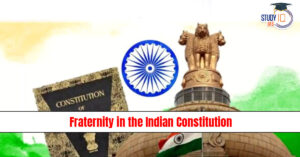Table of Contents
Blockchain technology, once synonymous with cryptocurrencies, has now become a cornerstone of digital governance. Its power lies in enabling verifiable trust without intermediaries, offering tamper-proof, transparent, and secure systems for data management.
Recognizing its potential, the Ministry of Electronics and Information Technology (MeitY) launched the National Blockchain Framework (NBF) — an ambitious project to integrate blockchain technology across various government sectors.
The framework aims to enhance efficiency, accountability, and transparency in public service delivery, aligning with the visions of Digital India and Aatmanirbhar Bharat.
What is Blockchain?
Blockchain is a distributed ledger technology (DLT) that records transactions in a secure, immutable, and transparent manner across multiple computers (nodes).
This makes unauthorized modifications almost impossible, ensuring data integrity and public trust.
Types of Blockchain:
-
Public Blockchain: Open to all users; allows full transparency.
-
Private Blockchain: Restricted to specific participants — ideal for government applications.
-
Consortium Blockchain: Shared governance by multiple organizations.
-
Hybrid Blockchain: Combination of public and private models for selective access.
National Blockchain Framework: India’s Digital Trust Infrastructure
The National Blockchain Framework (NBF), initiated in March 2021 and launched in September 2024, is India’s indigenous blockchain-based platform developed with an outlay of ₹64.76 crore.
Its core mission is to establish secure, scalable, and interoperable blockchain infrastructure for governance and public administration.
Core Components of the National Blockchain Framework
Vishvasya Blockchain Stack
The Vishvasya Blockchain Stack is the backbone of NBF — a modular, permissioned blockchain platform that allows the government to build blockchain applications without setting up separate infrastructure.
Key Features:
-
Blockchain-as-a-Service (BaaS): Shared blockchain infrastructure for public departments.
-
Distributed Data Centres: Located in Bhubaneswar, Pune, and Hyderabad for redundancy and scalability.
-
Open APIs: Seamless integration with existing e-Governance systems.
-
Permissioned Access: Only verified entities can validate transactions.
NBFLite: Innovation Sandbox
NBFLite is a sandbox environment designed for startups, students, and researchers to experiment with blockchain use cases.
It includes smart contract templates for governance, supply chain, and certification sectors, accelerating blockchain-based innovation.
Praamaanik: App Verification through Blockchain
In a digital world prone to fraudulent apps, Praamaanik ensures authenticity.
It uses blockchain to verify app sources, protecting users from data theft and malicious downloads.
National Blockchain Portal
The National Blockchain Portal acts as a central hub for blockchain initiatives, promoting standardization, innovation, and cross-sector adoption of blockchain solutions in India.
Blockchain Use Cases Transforming Governance
Certificate Chain
Blockchain is being used to securely store and verify academic and government-issued documents.
-
Over 34 crore documents have been verified on the blockchain platform.
-
Includes CBSE certificates, caste/income documents, and more.
Logistics Chain
Ensures traceability and transparency in supply chains.
Example: Aushada System (Karnataka) — tracks drug movement from manufacturers to hospitals, ensuring authenticity and safety.
Judiciary Chain & ICJS
The Judiciary Chain enhances transparency and reduces delays in the legal system by maintaining immutable judicial records.
-
Integrated with the Inter-Operable Criminal Justice System (ICJS), with 39,000+ documents verified on blockchain.
Property Chain
Secures land and property records through blockchain, ensuring ownership transparency and reducing fraud.
As of October 2025, 34 crore property documents have been verified.
Institutional Support and Regulatory Adoption
Centre of Excellence (CoE) – NIC
NIC’s CoE provides training, consultancy, and pilot testing support for government departments.
It collaborates with open-source platforms like Hyperledger Fabric, Hyperledger Sawtooth, and Ethereum.
TRAI and Blockchain Integration
TRAI uses Distributed Ledger Technology (DLT) to track telemarketing messages, reducing spam and fraud, with over 1.13 lakh entities onboarded.
RBI’s Blockchain Initiatives
The Reserve Bank of India has launched Digital Rupee (e₹) pilots, showcasing blockchain’s potential for transparent and efficient digital payments.
NSDL’s DLT Platform
NSDL has adopted blockchain for Debenture Covenant Monitoring, improving investor trust through tamper-proof and time-stamped records.
Capacity Building and Skill Development
To create a future-ready workforce, MeitY has introduced several capacity-building initiatives:
-
Skill Development Programmes: Trained 21,000+ officials in blockchain and emerging technologies.
-
PG Diploma in FinTech & Blockchain Development (PG-DFBD): A 900-hour professional course for blockchain and FinTech aspirants.
-
BLEND (C-DAC Online Course): Offers hands-on training in blockchain architecture and real-world application development.
-
FutureSkills PRIME: A national-level upskilling initiative covering blockchain and AI technologies.
Future Blockchain Use Cases
Upcoming pilot projects include:
-
Land Record Management for secure property ownership
-
Blood Bank Management for transparent donor tracking
-
GST Chain for real-time tax monitoring
-
Public Distribution System (PDS) for supply chain transparency
These innovations are set to transform India’s public administration through blockchain-enabled trust.
Conclusion
The National Blockchain Framework represents India’s commitment to secure, transparent, and efficient digital governance.
By combining indigenous innovation with strategic deployment, the NBF is paving the way for a trusted digital economy and self-reliant technological future.
With over 34 crore documents already verified and multiple use cases across sectors, India is on its path to becoming a global leader in blockchain-driven governance.


 Fraternity in the Indian Constitution �...
Fraternity in the Indian Constitution �...
 Fertiliser Sector Regulation in India: I...
Fertiliser Sector Regulation in India: I...
 New Gene Editing Method: Future of Perso...
New Gene Editing Method: Future of Perso...




















